-
 Bitcoin
Bitcoin $92,857.3496
-1.03% -
 Ethereum
Ethereum $1,750.4828
-2.45% -
 Tether USDt
Tether USDt $1.0005
0.05% -
 XRP
XRP $2.1885
-2.18% -
 BNB
BNB $597.4359
-1.69% -
 Solana
Solana $149.8729
-1.30% -
 USDC
USDC $1.0000
0.01% -
 Dogecoin
Dogecoin $0.1788
-0.25% -
 Cardano
Cardano $0.7255
3.02% -
 TRON
TRON $0.2464
0.28% -
 Sui
Sui $3.2757
10.22% -
 Chainlink
Chainlink $14.8489
-0.12% -
 Avalanche
Avalanche $22.0620
-1.11% -
 Stellar
Stellar $0.2755
2.43% -
 UNUS SED LEO
UNUS SED LEO $9.2218
1.65% -
 Toncoin
Toncoin $3.1533
-0.18% -
 Shiba Inu
Shiba Inu $0.0...01341
-1.13% -
 Hedera
Hedera $0.1856
1.66% -
 Bitcoin Cash
Bitcoin Cash $349.6685
-3.25% -
 Polkadot
Polkadot $4.1453
0.80% -
 Litecoin
Litecoin $82.8054
-1.43% -
 Hyperliquid
Hyperliquid $17.9889
-3.15% -
 Dai
Dai $1.0001
0.00% -
 Bitget Token
Bitget Token $4.4327
-1.75% -
 Ethena USDe
Ethena USDe $0.9995
0.02% -
 Pi
Pi $0.6476
-1.41% -
 Monero
Monero $227.9399
-0.28% -
 Uniswap
Uniswap $5.8086
-3.78% -
 Pepe
Pepe $0.0...08567
-4.18% -
 Aptos
Aptos $5.4495
1.50%
What is KYC in Bitcoin trading?
KYC in Bitcoin trading verifies user identities to prevent fraud and ensure compliance, but it raises privacy concerns and can hinder adoption in some regions.
Apr 20, 2025 at 08:21 pm
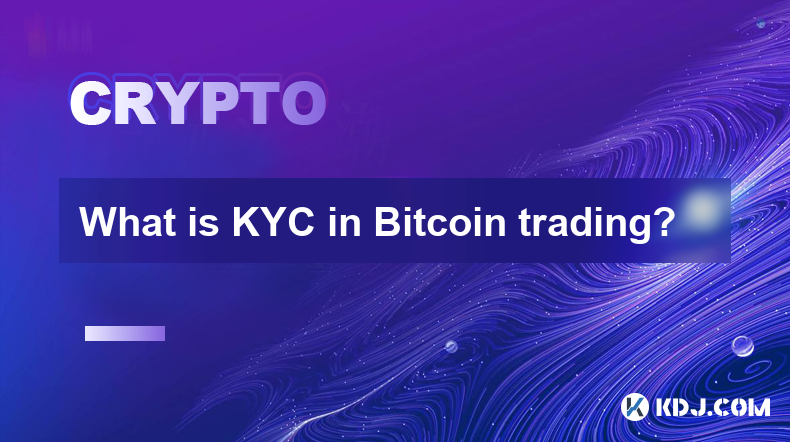
What is KYC in Bitcoin trading?
KYC, or Know Your Customer, is a crucial process in the world of Bitcoin trading and cryptocurrency exchanges. It involves verifying the identity of clients to prevent fraud, money laundering, and other illegal activities. In the context of Bitcoin trading, KYC procedures are implemented by exchanges to ensure compliance with regulatory requirements and to foster a safer trading environment for all users.
Understanding the Importance of KYC in Bitcoin Trading
The primary goal of KYC in Bitcoin trading is to enhance security and transparency. By requiring users to submit personal identification documents, exchanges can better monitor transactions and detect suspicious activities. This helps in maintaining the integrity of the platform and protecting users from potential scams. Moreover, KYC compliance is often a regulatory requirement in many jurisdictions, making it essential for exchanges to operate legally.
How KYC Works in Bitcoin Exchanges
When you sign up for a Bitcoin exchange, you will typically encounter a KYC verification process. This process involves several steps to confirm your identity and ensure that you are who you claim to be. Here's how it generally works:
- Registration: You start by creating an account on the exchange platform. This usually involves providing basic information such as your name, email address, and a password.
- Initial Verification: Some exchanges may require you to verify your email address or phone number before proceeding further.
- Document Submission: The next step involves submitting identification documents. These can include a government-issued ID (such as a passport or driver's license), proof of address (like a utility bill or bank statement), and sometimes a selfie to confirm your identity.
- Review and Approval: The exchange's compliance team will review your submitted documents. This process can take anywhere from a few minutes to several days, depending on the platform's workload and verification standards.
- Account Activation: Once your documents are approved, your account will be fully activated, and you can start trading Bitcoin and other cryptocurrencies.
Types of KYC Levels in Bitcoin Trading
Bitcoin exchanges often implement different levels of KYC to cater to various user needs and regulatory requirements. Here are some common KYC levels you might encounter:
- Basic KYC: This level usually requires minimal information, such as an email address and phone number. It allows for limited trading activities and lower withdrawal limits.
- Intermediate KYC: At this level, you may need to submit a government-issued ID and proof of address. This unlocks higher trading limits and additional features on the platform.
- Advanced KYC: For users who want to engage in high-volume trading or use advanced features, advanced KYC might be required. This often involves more thorough background checks and possibly additional documentation.
Challenges and Controversies Surrounding KYC in Bitcoin Trading
While KYC is essential for regulatory compliance and security, it is not without its challenges and controversies. One of the main concerns is privacy. Bitcoin was initially designed to offer a level of anonymity, and KYC requirements can be seen as a departure from this principle. Users may feel uncomfortable sharing personal information with exchanges, especially given the risk of data breaches.
Another challenge is the potential for KYC to create barriers to entry. The process can be cumbersome, particularly for users in regions with limited access to official identification documents. This can hinder the adoption of Bitcoin and other cryptocurrencies in some parts of the world.
Additionally, there is the issue of KYC fatigue. As users engage with multiple exchanges, they may need to go through the KYC process repeatedly, which can be frustrating and time-consuming.
The Role of KYC in Preventing Fraud and Money Laundering
One of the most significant benefits of KYC in Bitcoin trading is its role in preventing fraud and money laundering. By verifying the identity of users, exchanges can better track the flow of funds and detect any unusual activities. This helps in identifying and stopping potential criminal activities before they can cause harm.
For instance, if an account shows a sudden influx of large amounts of Bitcoin without a clear source, the exchange can flag this for further investigation. Similarly, if there are multiple accounts linked to the same individual or IP address, this could indicate an attempt to circumvent trading limits or engage in other suspicious activities.
KYC and Regulatory Compliance in Bitcoin Trading
Regulatory compliance is another critical aspect of KYC in Bitcoin trading. Many countries have implemented strict regulations to combat money laundering and terrorist financing, and KYC is a key component of these efforts. Exchanges that fail to comply with these regulations risk facing hefty fines or even being shut down.
For example, in the United States, the Bank Secrecy Act (BSA) and the USA PATRIOT Act require financial institutions, including cryptocurrency exchanges, to implement robust KYC and AML (Anti-Money Laundering) programs. Similar regulations exist in the European Union, Japan, and other jurisdictions.
Frequently Asked Questions
Q: Can I trade Bitcoin without going through KYC?
A: While some decentralized exchanges and peer-to-peer platforms may allow trading without KYC, most reputable centralized exchanges require some level of KYC verification. This is due to regulatory requirements and the need to maintain a secure trading environment.
Q: How long does the KYC process typically take?
A: The duration of the KYC process can vary depending on the exchange and the level of verification required. Basic KYC might be completed in a few minutes, while more advanced levels could take several days. It's best to check with the specific exchange for their estimated processing times.
Q: What happens if my KYC application is rejected?
A: If your KYC application is rejected, the exchange will typically notify you of the reason. Common reasons include unclear or invalid documents, discrepancies in the information provided, or failure to meet the exchange's requirements. You can usually resubmit the necessary documents to complete the verification process.
Q: Is my personal information safe during the KYC process?
A: Reputable exchanges take the security of your personal information seriously. They use encryption and other security measures to protect your data. However, it's essential to choose a trustworthy exchange and be cautious about sharing sensitive information online.
Disclaimer:info@kdj.com
The information provided is not trading advice. kdj.com does not assume any responsibility for any investments made based on the information provided in this article. Cryptocurrencies are highly volatile and it is highly recommended that you invest with caution after thorough research!
If you believe that the content used on this website infringes your copyright, please contact us immediately (info@kdj.com) and we will delete it promptly.
- How to Invest in Bitcoin According to Former Goldman Sachs Executive
- 2025-04-25 01:30:12
- JACKBIT Emerges as the Best Bitcoin Casino for 2025, Praised for Its No KYC Policy and Instant Withdrawals
- 2025-04-25 01:30:12
- ruya Becomes the First Islamic Bank to Offer Bitcoin and Virtual Asset Investments
- 2025-04-25 01:25:12
- Bitcoin reserves on cryptocurrency exchanges have dropped to their lowest level in more than six years
- 2025-04-25 01:25:12
- Bitcoin Soars : Satoshi Nakamoto’s Colossal Fortune
- 2025-04-25 01:20:12
- Don't Miss BTFD Coin's FINAL100 Bonus and $0.0002 Entry—Presale Ends May 26
- 2025-04-25 01:20:12
Related knowledge

How to buy and sell Bitcoin using a P2P platform?
Apr 18,2025 at 05:57pm
Buying and selling Bitcoin using a P2P (peer-to-peer) platform can be an efficient way to trade cryptocurrencies directly with other individuals. This method offers flexibility, often lower fees, and the ability to use various payment methods. In this article, we will walk through the process of buying and selling Bitcoin on a P2P platform, ensuring you...
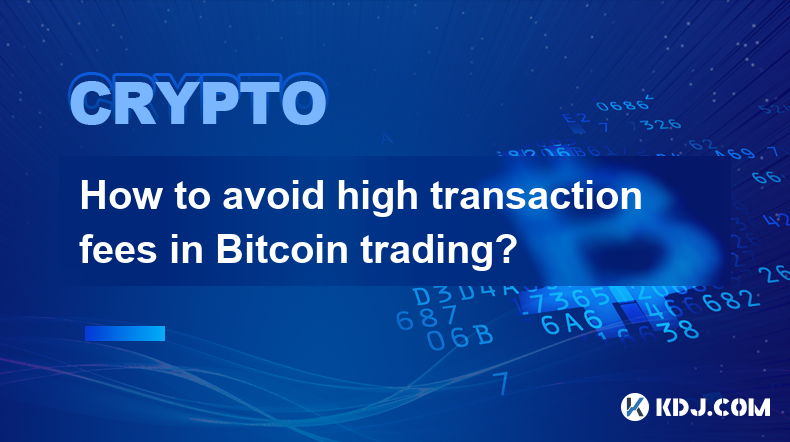
How to avoid high transaction fees in Bitcoin trading?
Apr 18,2025 at 12:14am
How to Avoid High Transaction Fees in Bitcoin Trading? Bitcoin trading can be exciting, but high transaction fees can quickly erode your profits. Understanding how to minimize these fees is crucial for any trader looking to maximize their returns. In this article, we will explore various strategies and techniques to help you avoid high transaction fees ...
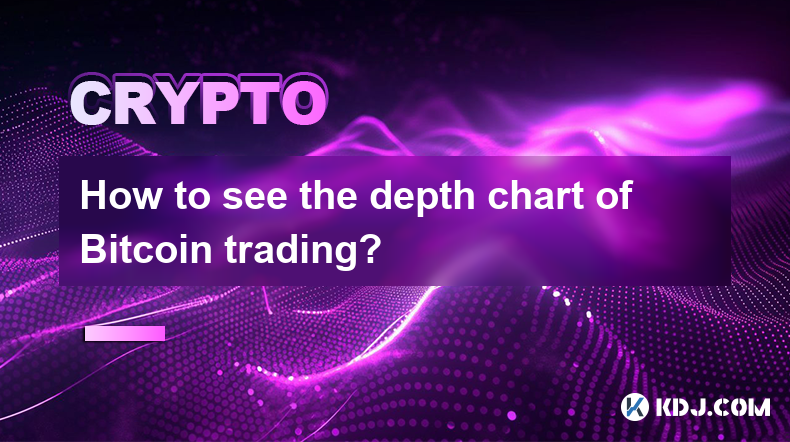
How to see the depth chart of Bitcoin trading?
Apr 17,2025 at 08:36am
Understanding the depth chart of Bitcoin trading is crucial for any serious cryptocurrency trader. The depth chart provides a visual representation of the supply and demand for Bitcoin at various price levels, helping traders make informed decisions about when to buy or sell. In this article, we will guide you through the process of accessing and interp...
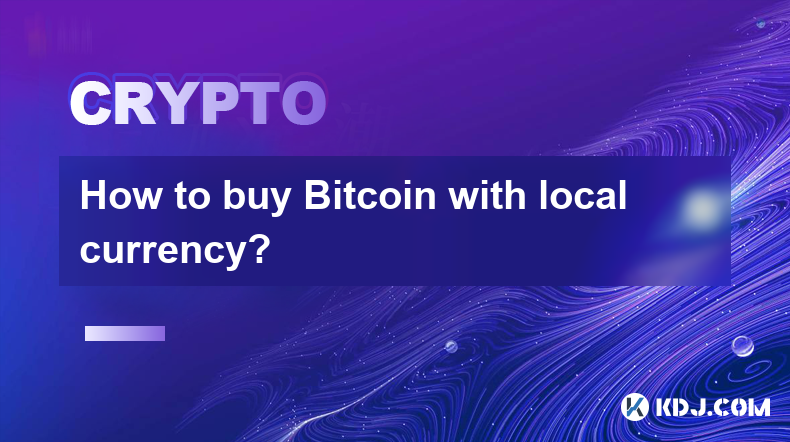
How to buy Bitcoin with local currency?
Apr 18,2025 at 01:22am
Buying Bitcoin with local currency is a straightforward process that allows you to enter the world of cryptocurrencies using your familiar fiat money. Whether you are a beginner or an experienced investor, understanding the steps to acquire Bitcoin with your local currency can help you make informed decisions and manage your investments effectively. In ...

What is the Lightning Network in Bitcoin trading?
Apr 19,2025 at 02:35am
The Lightning Network is a second-layer scaling solution designed to enhance the speed and efficiency of Bitcoin transactions. It operates as an off-chain network that allows users to conduct multiple transactions without the need to settle each one individually on the Bitcoin blockchain. This significantly reduces transaction fees and speeds up the pro...
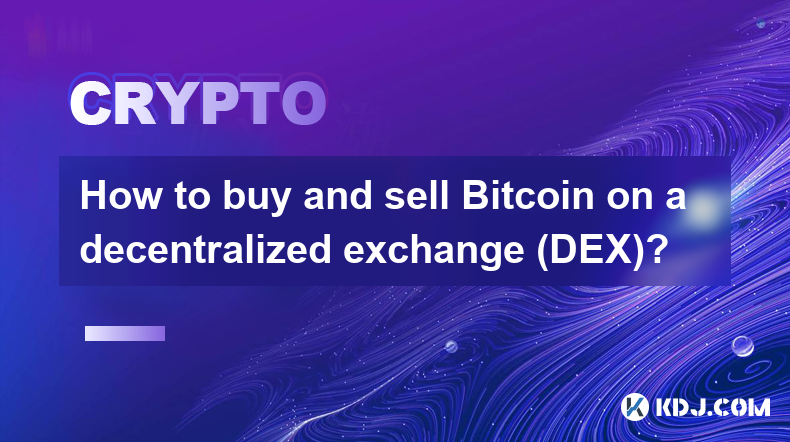
How to buy and sell Bitcoin on a decentralized exchange (DEX)?
Apr 18,2025 at 02:42am
Buying and selling Bitcoin on a decentralized exchange (DEX) offers a different experience compared to traditional centralized exchanges. DEXs provide more privacy and control over your funds, as they allow you to trade directly with other users without an intermediary. This guide will walk you through the process of buying and selling Bitcoin on a DEX,...

How to buy and sell Bitcoin using a P2P platform?
Apr 18,2025 at 05:57pm
Buying and selling Bitcoin using a P2P (peer-to-peer) platform can be an efficient way to trade cryptocurrencies directly with other individuals. This method offers flexibility, often lower fees, and the ability to use various payment methods. In this article, we will walk through the process of buying and selling Bitcoin on a P2P platform, ensuring you...

How to avoid high transaction fees in Bitcoin trading?
Apr 18,2025 at 12:14am
How to Avoid High Transaction Fees in Bitcoin Trading? Bitcoin trading can be exciting, but high transaction fees can quickly erode your profits. Understanding how to minimize these fees is crucial for any trader looking to maximize their returns. In this article, we will explore various strategies and techniques to help you avoid high transaction fees ...

How to see the depth chart of Bitcoin trading?
Apr 17,2025 at 08:36am
Understanding the depth chart of Bitcoin trading is crucial for any serious cryptocurrency trader. The depth chart provides a visual representation of the supply and demand for Bitcoin at various price levels, helping traders make informed decisions about when to buy or sell. In this article, we will guide you through the process of accessing and interp...

How to buy Bitcoin with local currency?
Apr 18,2025 at 01:22am
Buying Bitcoin with local currency is a straightforward process that allows you to enter the world of cryptocurrencies using your familiar fiat money. Whether you are a beginner or an experienced investor, understanding the steps to acquire Bitcoin with your local currency can help you make informed decisions and manage your investments effectively. In ...

What is the Lightning Network in Bitcoin trading?
Apr 19,2025 at 02:35am
The Lightning Network is a second-layer scaling solution designed to enhance the speed and efficiency of Bitcoin transactions. It operates as an off-chain network that allows users to conduct multiple transactions without the need to settle each one individually on the Bitcoin blockchain. This significantly reduces transaction fees and speeds up the pro...

How to buy and sell Bitcoin on a decentralized exchange (DEX)?
Apr 18,2025 at 02:42am
Buying and selling Bitcoin on a decentralized exchange (DEX) offers a different experience compared to traditional centralized exchanges. DEXs provide more privacy and control over your funds, as they allow you to trade directly with other users without an intermediary. This guide will walk you through the process of buying and selling Bitcoin on a DEX,...
See all articles























































































